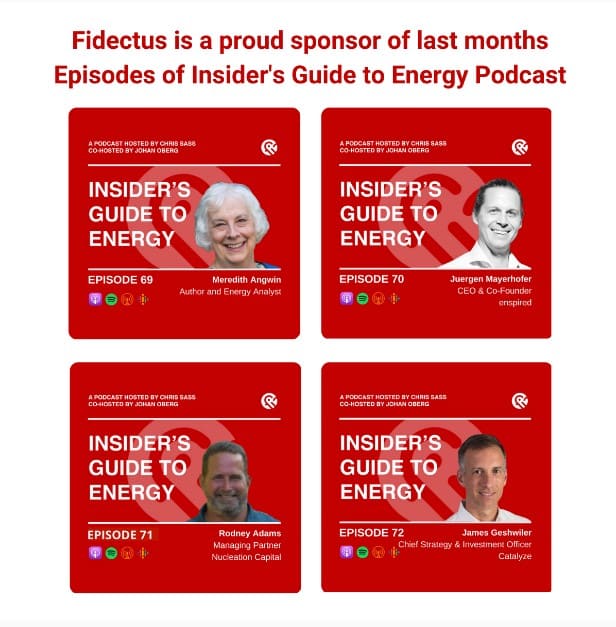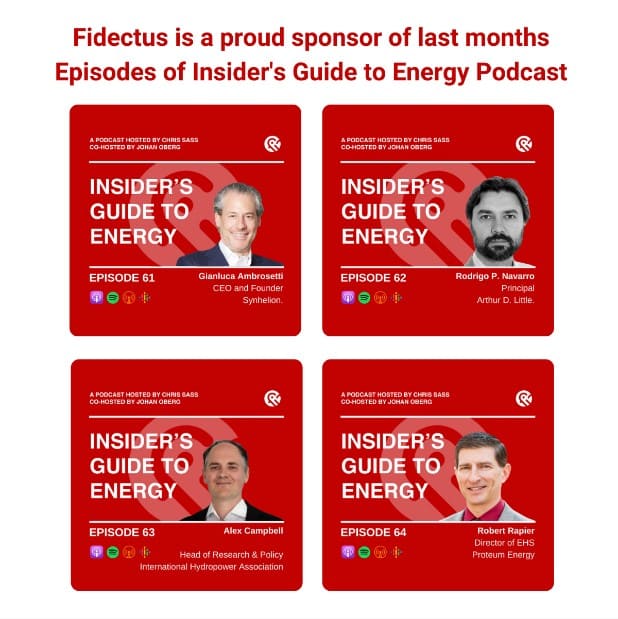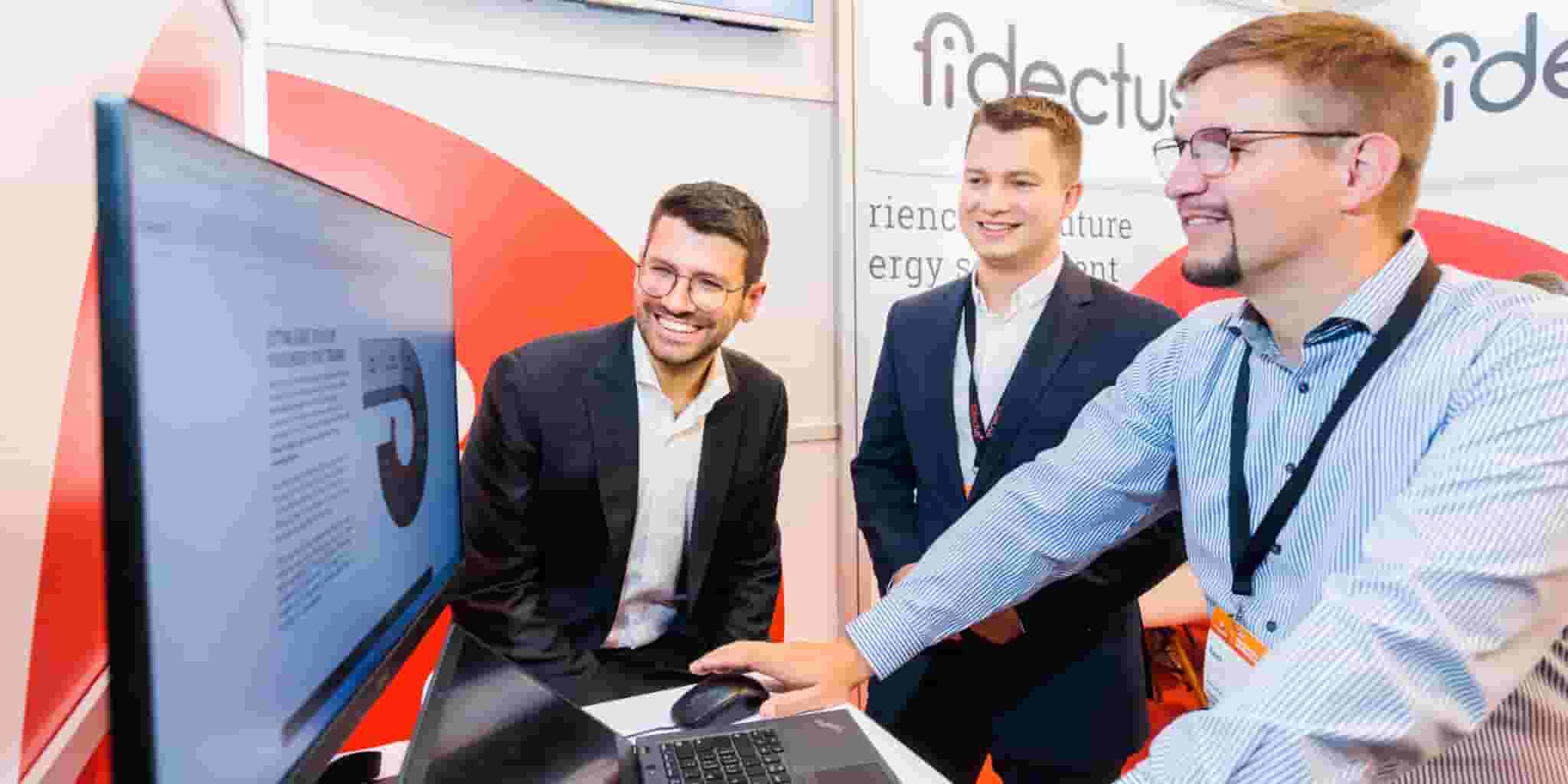1 min read
Proud sponsors of Insider's Guide to Energy Episodes: May 2022
Zürich, 31 May 2022 – This month Chris Sass, Johan Oberg and Marcelo Ortega are joined by Meredith Angwin (author of the book “shorting the grid”),...
3 min read
Anna Antunes : Jun 24, 2025 2:21:07 PM

At our recent Fidectus Summit in Zurich, we hosted a panel discussion focused on the evolving dynamics of the Guarantees of Origin (GO) market. In this article, we will explore three key areas discussed: The current state of the GoO market, key risks and inefficiencies, and the necessary reforms to ensure it remains a viable, scalable, and trusted tool in Europe’s energy transition.
Whether you are managing GOs today or preparing for what is next, this summary provides an interesting perspective on the shifting landscape and highlights the panel’s view on what constitutes an effective response.
Market overview
Over the past decade, the GO market has evolved from a fragmented, often overlooked compliance instrument into a cornerstone of Europe’s renewable energy certification framework. Initially designed to support basic disclosure requirements, GOs have grown to play a central role in enabling transparent, market-based claims of renewable electricity consumption and supporting corporate decarbonisation efforts through facilitating Scope 2 emissions reductions¹. This shift reflects both the maturation of voluntary climate action and the increasing need for credible tracking systems in energy transition frameworks.
As demand for GOs has surged from approximately 150 TWh in 2010 to over 900 TWh in 2024², the market is now grappling with a sharp decline in prices from €7–8 in 2023 to just €0.20–0.40 in 2024. This drop is largely attributed to market oversupply, the contentious inclusion of nuclear-generated GOs, and stagnating buyer demand. The resulting value erosion has effectively collapsed quality distinctions across technologies, regions, and vintages, undermining the market’s ability to deliver a strong and credible decarbonisation signal to consumers and institutional investors alike.
The GO market faces growing pressure
The GO market is entering a new phase - one defined by mounting challenges. Prices are falling, threatening the strength of market signals and shaking consumer trust. Operational inefficiencies persist, and regulatory uncertainty is increasing, raising doubts about the long-term role of market-based mechanisms. In this context, the need for simplification, automation, and standardisation is more urgent than ever.
Manual operations are holding the market back
Despite the growth of GO markets, core processes remain largely manual. Many registries lack functional APIs, and integration with ETRM systems is limited. As a result, Excel is still widely used to manage GOs, leaving companies exposed to serious risks like double booking, reporting errors, and missed cancellations. Some errors have led to losses exceeding €500,000.
While GOs are often treated as low-value, low-risk instruments by front offices, the operational burden falls heavily on back-office teams. This disconnect creates bottlenecks that compromise compliance, scalability, and efficiency across the market.
24/7 Matching: A case of too much, too soon?
Advanced mechanisms like 24/7 hourly matching are gaining traction, especially among forward-leaning market participants. But adoption is moving faster than infrastructure and participants can support.
Rolling out complex systems prematurely poses real risks:
- Added complexity can erode trust;
- Distorted price signals may reduce market transparency; and
- Users may shift to simpler, less impactful alternatives - like nuclear GOs.
Interoperability remains a core challenge
A major obstacle to market efficiency is the lack of interoperability between registries, trading platforms, and internal systems. Without standardised APIs and real-time data sharing, participants are left dealing with:
- Fragmented, inconsistent information;
- Operational delays; and
- Higher risk of human and system errors.
Improving interoperability would enable full automation, cross-border visibility, and a more connected, scalable GO market.
Market design is out of sync with reality
Current market design also presents structural issues. Order book systems have struggled to support efficient trading, largely due to low liquidity and highly specific buyer preferences, whether by technology, geography, or time.
In contrast, Request for Quote models provide:
- Greater price transparency;
- Tailored procurement workflows; and
- A better match with how companies actually buy renewable attributes.
Policy shifts could undermine market-based GOs
Changes to the GHG Protocol and ISO standards are introducing new uncertainty. These updates may favor location-based accounting over market-based GOs, potentially sidelining the very mechanisms that drive choice and flexibility.
This would:
- Limit how buyers meet sustainability goals
- Reduce market relevance; and
- Undermine decades of voluntary progress.
To maintain integrity and usability, panelists recommend pragmatic compromises, such as monthly matching - striking a balance between operational feasibility and environmental credibility.
GOs aren’t broken — they’re misunderstood; practical strategies to stay ahead
When simplified, standardised, and digitised, GOs remain the most credible, scalable, and transparent mechanism for enabling renewable energy claims and accelerating decarbonisation.
Fidectus enhances GO operations by automating post-trade processes (confirmations and settlement), significantly reducing manual effort and reconciliation time. Its smart validation workflows help minimise errors like double booking and missed cancellations.
We also offer a template builder, allowing counterparties to standardise contractual terms and processes, ensuring everyone operates from the same foundation and builds to each individual counterparty's needs. This not only improves clarity but also accelerates onboarding and reduces the risk of misalignment. Combined with our partner ecosystem offering full transaction traceability, these features strengthen audit readiness and elevate the strategic value of GOs across front and back-office functions.
Ultimately, a consolidated view of GO holdings is achievable with Fidectus combined with our partner’s solutions and interoperability across registries.
¹ Greenhouse Gas Protocol, Scope 2 Guidance. World Resources Institute and World Business Council for Sustainable Development. Available at: https://ghgprotocol.org/scope_2_guidance
² Association of Issuing Bodies (AIB), “European Energy Certificate Statistics,” 2024. Available at: https://www.aib-net.org

1 min read
Zürich, 31 May 2022 – This month Chris Sass, Johan Oberg and Marcelo Ortega are joined by Meredith Angwin (author of the book “shorting the grid”),...

1 min read
Zürich, 5 April 2022 – This month Chris and Johan are joined by Gianluca Ambrosetti (CEO and founder of Synhelion), Rodrigo P. Navarro (strategic...

Zürich, 28. June 2022 - E-world 2022 has finished. Interest at Fidectus´ booth has been off the charts. Fidectus had a constant flow of traders and...